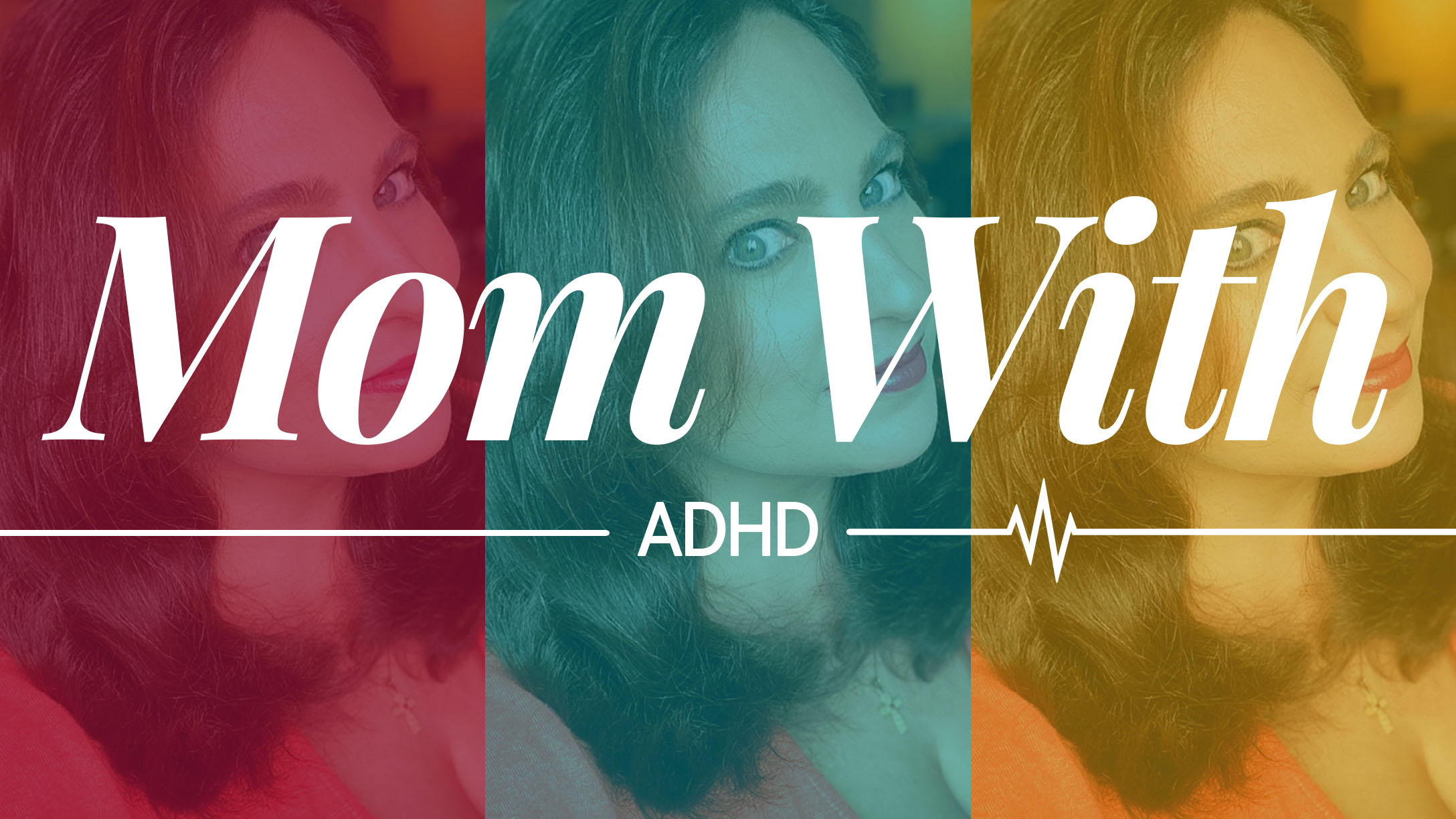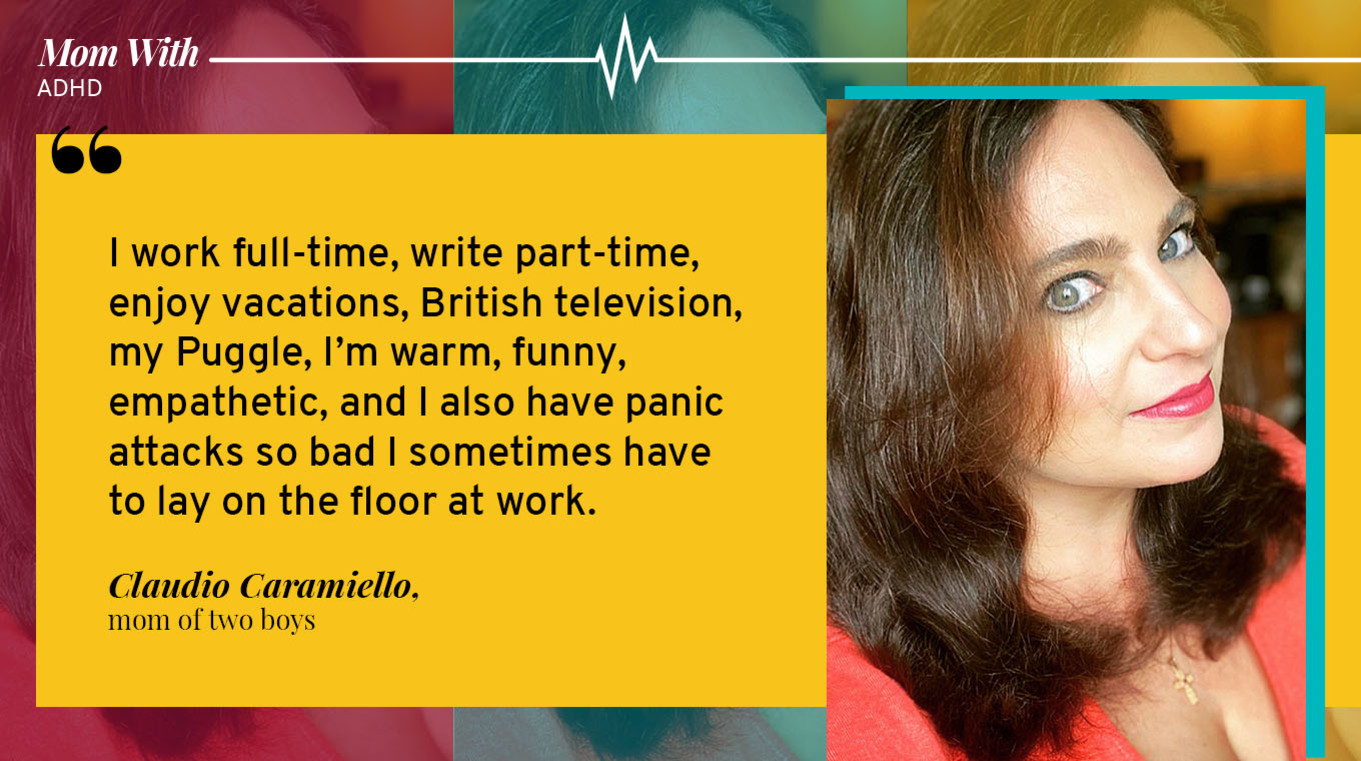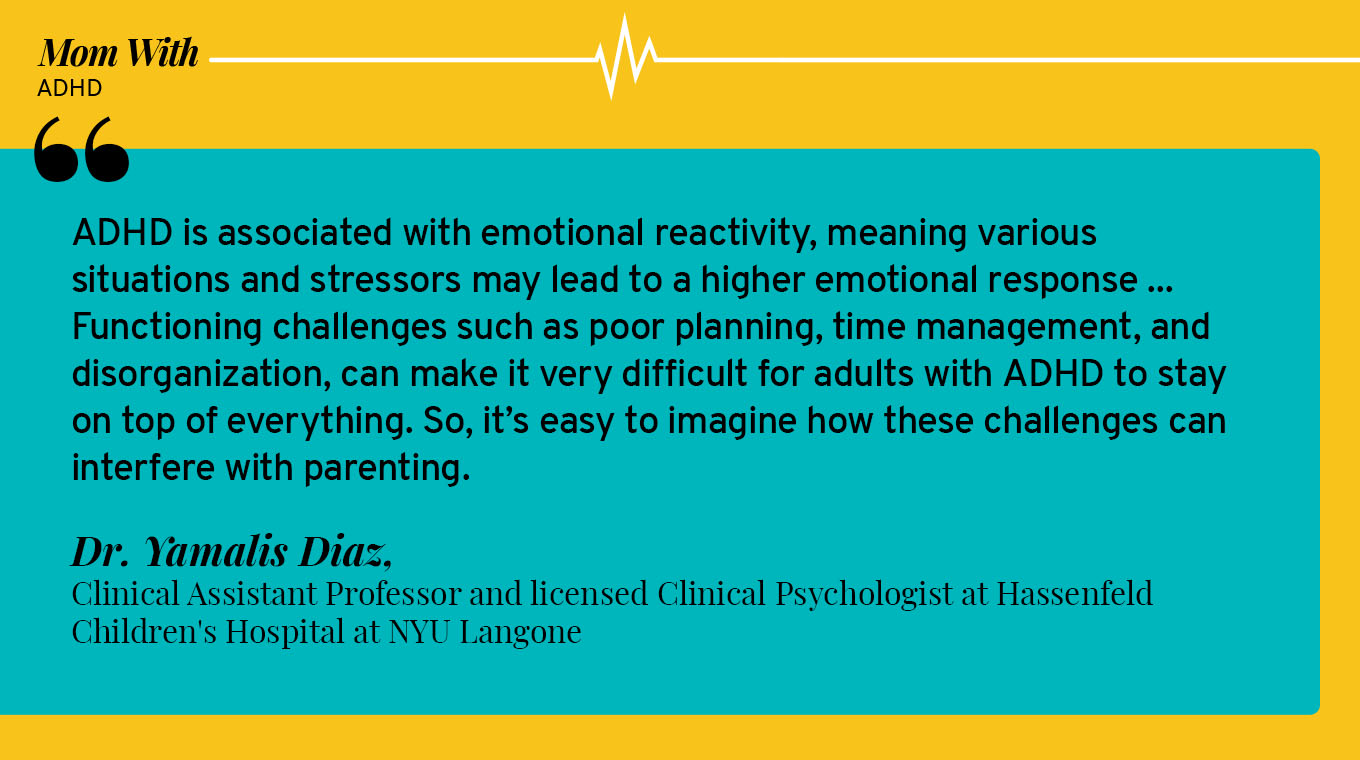
Our new monthly column MOM WITH aims to redefine what it means to be a "normal" mother by focusing on how it feels to live with a mental disorder. We see you, we hear you, and we're in this together.
As a young child, Claudio Caramiello, often felt scared and could not sleep. People would tell her mother that she was the only baby they had ever seen with dark circles around her eyes. Those dark circles were clearly a sign of something more and Claudio, a certified pharmacy technician, freelance writer and mother, now suffers from major depressive disorder, anxiety, ADHD, insomnia, and PTSD.
When Claudio got older, things seemed to get better. But at the age of 14, she started struggling with intense depression.
“Intrusive thoughts and obsession with death gripped me," says Claudio. "This went on and off through my teen years and young adult. I thought I was crazy and prayed to be normal.”
Finally, at the age of 22, Claudio made the decision to start seeing a psychiatrist, which helped greatly in addition to medication. She had several good depression-free years, until she had welcomed her first son, and within six weeks was put on Xanax for the first time.
"Therapy and antidepressants took the edge off, but becoming a mother has definitely added a new layer to my mental health issues and the older the kids get the less control I have of protecting them," says Claudio.
ADHD in adults is associated with many challenges that can interfere with a person’s optimal functioning at home, so it is expected that these challenges would interfere with parenting. Dr. Yamalis Diaz, clinical assistant professor and licensed clinical psychologist at Hassenfeld Children's Hospital at NYU Langone explains.
“Functioning challenges, such as poor planning, time management, and disorganization, can make it very difficult for adults with ADHD to stay on top of everything," Diaz notes. "So, it’s easy to imagine how these challenges can interfere with parenting, particularly among mothers who often assume the majority of responsibility for managing the home, requiring a high level of organized, time-efficient, multi-tasking … all while parenting!”
Like any good mom, Claudio does what she can to protect her two sons, including trying to hide her mental issues from them. But she admits now that they are teenagers, it’s nearly impossible.

“It’s difficult because they can now see some of my issues and see my prescription bottles. I never want to burden them, but I try to get them to understand and be empathetic. Teen boys can be rough, and I have been made fun by them which crushes me.”
Three years ago, Claudio and her sons were in a bad car accident. They were lucky to be alive and made it out OK, but the accident left mental scars for Claudio. In addition to already suffering from anxiety, the accident brought to light a whole new level of worries, including a fear of driving.
“Driving became almost impossible and I would have to pull over several times because of panic attacks and my children witnessed it all. It was a horrible time because my older son who thought the accident was exciting would make fun of me. I avoided driving at night and refused to drive on the road where the accident took place.”
Unfortunately, mothers with ADHD are at an increased risk of anxiety and depression.
“ADHD is associated with emotional reactivity, meaning various situations and stressors may lead to a higher emotional response," says Diaz. "In addition, the pattern of recurring challenges with managing life’s demands can certainly exacerbate anxiety and depressed mood. This is true for most over-stressed parents in general, but understandably so, even more for a parent with ADHD.
"When you’re stressed and overwhelmed, the ADHD brain has an even harder time focusing and regulating emotions, so naturally stress continues to rise and could culminate in emotional distress (i.e., anxiety, depression, etc.)."
As Claudio has admitted, having teen sons can be enough of a challenge and she remembers one moment that left her feeling completely helpless.
“My boys went to see the first Marvel Endgame movie where Thanos is trying to destroy half the world. When they returned, they told me there was a character in the movie that I would relate to. I remember my son saying he’s exactly like you! When I finally saw the movie, the character Thor, had become broken, overweight, and consumed with anxiety. He would panic and breathe rapidly saying, 'I’m OK, I’m OK. I did the same thing.'”
The fact that this was how her children viewed her, nearly broke her. It made her feel angry because even though she felt scared about driving, she forced herself to drive longer distances and never gave up. She fought hard to regain control and was hurt that her children couldn’t see that.
“It’s sometimes frustrating because yes, they see me as depressed, and they have seen me with anxiety so intense I thought I was having a heart attack, but they don’t see how hard I fight back,” says Claudio.
Structure, habits, and strategy are key when it comes to managing ADHD, all while parenting.
“This means daily routines, reminders, alarms, timers, To-Do lists, planners … oh my!” encourages Diaz. “The challenge for many adults with ADHD is developing and sticking to these types of habits, as they often try them and then stop using them due to the very ADHD-related deficits they are working to address. I encourage mothers to think of the small habits they can build into their routines to offset these challenges.
"Something as simple as setting a reminder for a specific time when you will sit down to review your To-Do list or even consolidate the multiple lists can improve the likelihood that they will complete those tasks. In the end, the more organized a parent is, the more organized their parenting will be.”
A good day for Claudio is when her anxiety is low and intrusive thoughts are at bay, and she manages to get a decent night’s sleep.

She goes to work and looks forward to seeing her coworkers. She’s focused and energetic. She texts or call her kids and send them GIFs. Sometimes she and her sons will go to the movies.
“On a good day my house is cleaner," says Claudio. "Sometimes I will write an article or watch a new show on Netflix. I’ll call my mom, too. On a good day I will usually wear makeup, especially on my eyes and will wash my hair.”
But a bad day can go from bad to terrible incredibly quickly.
Claudio won’t wear makeup or wash her hair. An intense fear and panic that something bad will happen will have her feeling a looming sadness, even if nothing has happened.
“Usually, I make it through the day and just cry once, then watch old tv shows that I’ve seen thousands of times. Knowing the ending of the shows is comforting. Sometimes I will have a panic attack so big I can’t hide it from my coworkers. A few weeks ago, at work I was convinced I was having a heart attack. I had to lay on the floor while my boss and coworkers talked me through it. They are wonderful.”
In recent years, Claudio has been more open about her mental health struggles.
She sometimes wishes she could be “normal” but reminds herself, that nobody really is. We all need to be better about remembering that there is no such thing as normal or perfect, especially when it comes to being a mother. We’re all just doing the best we can with what we’ve been given, Claudio included.
“Sometimes I get flak from my mom about sharing too much on Facebook, but honestly if it’s OK for someone to post details about their heart attack, or diabetes struggles, it’s OK to post about mental health struggles. It doesn’t define me, but it is a part of me. I work full time, write part time, enjoy vacations, British television, my Puggle, I’m warm, funny, empathetic, I also have panic attacks so bad I sometimes have to lay on the floor at work.”
In the world we live in today, there is too often the idea of a perfect mother, which doesn’t exist.
Sadly, that can mean judging mothers who deal with mental illnesses and thinking that they are less competent than other mothers, which is not accurate, as Diaz confirms. “That is unequivocally not true! It is true that ADHD is associated with challenges that make parenting and home management more difficult, which can result in stress and negative parent-child interactions, but this can be managed/treated and certainly does not preclude mothers with ADHD from being really good moms.”
As far as being a normal mother, Claudio has learned to embrace who she is and embrace the good and the bad. Claudio feels that being a mom is exhausting, heart wrenching, and difficult, but it is also an amazing, beautiful, experience. I think these are words that any mom can relate to- whether they struggle with mental health issues or not. At the end of the day, being a mom is being a mom. What defines us is the love and care we have for our children.




